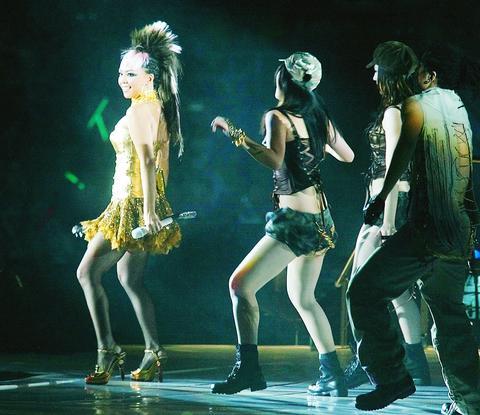Pop music diva Chang Hui-mei (張惠妹), also known as A-mei, returned home early yesterday after performing in a controversial concert in Beijing on Saturday night. The singer was following through on her earlier vow to hold the Beijing concert despite threats of disruption by Chinese ultra-nationalists.
Throngs of protesters heckled the Puyuma Aboriginal singer, holding red banners protesting "pro-independence Taiwanese businesspeople." Her Chinese fans rushed to her defense, however, leading to scuffles between the two groups, which were quickly broken up by Chinese police.

PHOTO: AP
According to media reports, A-mei's fans begged her not to be disturbed by the raucous protesters, who were also demanding that A-mei sing March of the Volunteers, the Chinese national anthem.
The singer reportedly broke down and wept onstage, even as her Chinese supporters cheered her on and called out to her not to cry. A-mei told the estimated 10,000-strong audience that she had never felt such great pressure at a concert before.
Still, the 31-year-old singer from Taitung County carried on and finished her set.
A-mei became the focus of international controversy on June 12 when she was forced to cancel a concert in Hangzhou after students from Zhejiang University branded her a "supporter of Taiwanese independence." Several hundred students invaded a press conference at which the pop star had been scheduled to appear, chanting slogans and holding banners decrying the "green performer." Fearing for A-mei's safety, the organizers canceled her appearance.
However, the Mainland Affairs Council later described the students as "Beijing's dupes," who were probably acting with official encouragement.
The lambasting of Taiwanese performers for their supposed political preferences is a common occurrence in China. Internet discussion boards and forums often carry virulently aggressive messages attacking Taiwanese "splittists," China's propaganda term of choice for pro-independence or anti-unification figures.
After the re-election of President Chen Shui-bian (
A-mei initially gained the attention of Chinese authorities after singing the national anthem at Chen's inauguration in 2000.
At that time, the singer was blacklisted, lost a sponsorship deal with the Coca-Cola company and was subjected to a media blackout in China.
Yesterday, in a bizarre turn of events, some pro-independence groups called for a boycott of A-mei in response to comments she made upon her return, which were apparently meant to mollify her Chinese critics.
"I'm a Chinese person, and I sing Chinese people's songs," the singer told reporters at CKS International Airport.
"Shame on you A-mei. You are an embarassment to Aborigines and all Taiwanese people," one contributor wrote on a forum discussing A-mei at www.southnews.com.tw.

Taiwan is stepping up plans to create self-sufficient supply chains for combat drones and increase foreign orders from the US to counter China’s numerical superiority, a defense official said on Saturday. Commenting on condition of anonymity, the official said the nation’s armed forces are in agreement with US Admiral Samuel Paparo’s assessment that Taiwan’s military must be prepared to turn the nation’s waters into a “hellscape” for the Chinese People’s Liberation Army (PLA). Paparo, the commander of the US Indo-Pacific Command, reiterated the concept during a Congressional hearing in Washington on Wednesday. He first coined the term in a security conference last

Prosecutors today declined to say who was questioned regarding alleged forgery on petitions to recall Democratic Progressive Party (DPP) legislators, after Chinese-language media earlier reported that members of the Chinese Nationalist Party (KMT) Youth League were brought in for questioning. The Ministry of Justice Investigation Bureau confirmed that two people had been questioned, but did not disclose any further information about the ongoing investigation. KMT Youth League members Lee Hsiao-liang (李孝亮) and Liu Szu-yin (劉思吟) — who are leading the effort to recall DPP caucus chief executive Rosalia Wu (吳思瑤) and Legislator Wu Pei-yi (吳沛憶) — both posted on Facebook saying: “I

Sung Chien-liang (宋建樑), who led efforts to recall Democratic Progressive Party (DPP) Legislator Lee Kun-cheng (李坤城), was released on bail of NT$80,000 today amid outcry over his decision to wear a Nazi armband to questioning the night before. Sung arrived at the New Taipei District Prosecutors’ Office for questioning in a recall petition forgery case last night wearing a red armband bearing a swastika, carrying a copy of Adolf Hitler’s Mein Kampf and giving a Nazi salute. Sung left the building at 1:15am without the armband and covering the book with his coat. Lee said today that this is a serious

A court has approved Kaohsiung prosecutors’ request that two people working for Democratic Progressive Party (DPP) Legislator Lin Dai-hua (林岱樺) be detained, as a probe into two cases allegedly involving her continues. The request was made on Friday, after prosecutors raided Lin’s two offices and the staffers’ residences, and questioned five on suspicion of contravening the Anti-Corruption Act (貪汙治罪條例). The people included the directors of Lin’s Daliao (大寮) and Linyuan (林園) district offices in Kaohsiung, surnamed Chou (周) and Lin (林) respectively, as well as three other staffers. The prosecutors’ move came after they interrogated Lin Dai-hua on Wednesday. She appeared solemn following